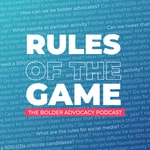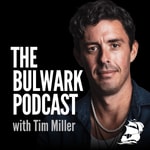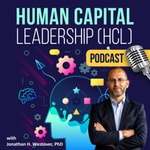Rules of the Game: The Bolder Advocacy Podcast – Détails, épisodes et analyse
Détails du podcast
Informations techniques et générales issues du flux RSS du podcast.

Rules of the Game: The Bolder Advocacy Podcast
Bolder Advocacy
Fréquence : 1 épisode/14j. Total Éps: 100

Classements récents
Dernières positions dans les classements Apple Podcasts et Spotify.
Apple Podcasts
🇺🇸 États-Unis - nonProfit
26/06/2025#84🇺🇸 États-Unis - nonProfit
23/06/2025#67🇺🇸 États-Unis - nonProfit
22/06/2025#44🇺🇸 États-Unis - nonProfit
21/06/2025#79🇺🇸 États-Unis - nonProfit
19/06/2025#92🇺🇸 États-Unis - nonProfit
17/06/2025#98🇺🇸 États-Unis - nonProfit
15/06/2025#82🇺🇸 États-Unis - nonProfit
14/06/2025#52🇺🇸 États-Unis - nonProfit
13/06/2025#67🇺🇸 États-Unis - nonProfit
22/05/2025#81
Spotify
Aucun classement récent disponible
Liens partagés entre épisodes et podcasts
Liens présents dans les descriptions d'épisodes et autres podcasts les utilisant également.
See all- https://stopaapihate.org/
430 partages
- https://www.aclu.org/
103 partages
- https://theoceancleanup.com/
38 partages
- https://youtu.be/XNt-9v3HY30s
2 partages
Qualité et score du flux RSS
Évaluation technique de la qualité et de la structure du flux RSS.
See allScore global : 52%
Historique des publications
Répartition mensuelle des publications d'épisodes au fil des années.
Litigation
Épisode 112
mercredi 21 août 2024 • Durée 17:35
As we’ve talked about on previous editions of the pod, advocacy includes a wide array of different options to help change things for the better in our communities. One of the more important, but less discussed methods, is litigation. On this episode, we dive into the role litigation plays in nonprofit advocacy, its treatment under the law, and things to think about if your nonprofit is looking to use this tool for good.
Lawyers for this episode
Natalie Ossenfort
Tim Mooney
Quyen Tu
- Litigation as an advocacy tool (citizen suits, appeals, amicus briefs etc.)
- Treatment under tax law
- Relation to charitable purpose
- Not lobbying under 501(h) or insubstantial part definitions
- Not limited by IRS / Tax Code
- Spectrum of engagement
- Example: Letter of Support signed by over 225 organizations in support of the Fearless Foundation (currently under legal attack for a program that supports the funding of black female entrepreneurs)
- Example: In 2018, Alliance for Justice and Council on Foundations filed a joint amicus brief in the case of Parks Foundation vs. Commissioner of Internal Revenue arguing for a narrow interpretation of what it means to “express a view on specific legislation” when determining whether a nonprofit’s activities constitute lobbying.
- Example: Lambda Legal focuses on litigation in support of LGBTQ+ rights and individuals living with HIV/AIDS. They represent clients in cases involving discrimination, marriage equality, and transgender rights, participating in all stages of litigation. Currently representing AFJ member PFLAG in a Texas case.
- Example: Clean Water Act citizen suits suing polluters for discharges without a permit – we’ll talk more about this specifically later
- Standing: must show harm to the organization or members of the organization
- Publicly supporting (or opposing) another organization’s litigation
- Amicus briefs
- Representing clients
- Litigating as a plaintiff (citizen suits, standing)
- Things to think about
- The law (who are the experts in relevant area of law?)
- The courts (judges matter!) - For more check out AFJ’s federal and state court resources on our website.
- Capacity (internal or external)
- Staff and resources (funding and time)
- Reputation with funders, members, public
- In-house or outside counsel
- Media impact and PR
- Insurance (not sure if this is too deep in the weeds?)
- Examples
- Lawsuits typically target government agencies, industrial polluters, and corporations to enforce existing environmental laws
- Clean Water, Clean Air Act, National Environmental Policy Act (NEPA), Endangered Species Act, Resource Conservation and Recovery Act (RCRA), Safe Drinking Water Act
- Litigates claims of actual innocence made by individuals convicted of serious crimes in Texas.
- Example: Former client, Johnny Pinchback, wrongfully convicted of sexual assault of two teenage girls in Dallas (proven innocent via DIA testing) and formally exonerated via post-conviction habeas corpus litigation
- Stories of clients like Johnny led to increased public awareness of wrongful convictions and even legislative reforms
- Earthjustice (AFJ member) + Waterkeeper Alliance
- Legal Services Corporation & regional public interest law; Legal Aid at Work, Legal Aid Association of CA, CA Women’s Law Center, Tzedek
- Innocence Project of Texas (member of Innocence Network, which is also home to AFJ Member, Innocence Project)
- Resources
- Issue Advocacy: Why Courts Matter
- State Courts Hub
- AFJ Database of reports on federal judges and judicial nominees
Student Advocacy
Épisode 111
mercredi 7 août 2024 • Durée 15:28
In this episode of the podcast, we explore the importance of student advocacy and voting. Additionally, we discuss how 501(c)(3) organizations can engage in advocacy efforts during election season. Joining us today is Ally, our Bolder Advocacy legal intern, to answer questions about the impact of student advocacy on campus.
Hosts:
Susan Finkle Sourlis (Attorney)
Monika Graham (Attorney)
Alexandra Roseberry (Intern)
- On-Campus Advocacy Culture
- On-Campus Activities
- Voter Laws and Students
- Getting Involved With Advocacy as a Student
- How Nonprofits Can Participate in Nonpartisan Voting Education
- Voter Registration Programs
- Encouraging Voting
- Polling Information
- How 501(c)(3)s Can Engage During Election Season
- Issue Advocacy
- Candidate Education
- Voter Education
- Voter Engagement
- Ballot Measures
- Private Foundations
- Student Organizations and Youth Groups
- Rhizome
- Youth on Root
Resources:
- Rules of the Game - https://afj.org/resource/the-rules-of-the-game-a-guide-to-election-related-activities-for-501c3-organizations/
- Our guidelines for most of the 50 states on voter outreach and voter registration activities - https://afj.org/bolder-advocacy/practical-guidance-nonprofit-voter-assistance-series/
- Project Grant Rule
- ACLU KYR - https://www.aclu.org/know-your-rights
- https://www.nonprofitvote.org/get-registered-to-vote/
- https://www.lawyerscommittee.org/
- Rhizome - https://www.werhize.org/
- Youth on Root - https://www.youthonroot.org/
Election Season Advocacy: What Your Foundation Needs to Know
Épisode 102
mercredi 3 avril 2024 • Durée 17:09
Guess What! It’s 2024, which means we have a BIG election on the horizon. Not only will voters take to the polls to decide who will be our next President, but they’ll also be invited to speak their voice in relation to ballot measures and down ballot races that will impact our laws and determine who will represent us in local government, state legislatures, Congress, the courts, and more! With so much at stake, many private and public foundations may be curious whether they have a role to play. The answer is YES! And, this episode of the podcast will discuss the rules foundations need to know when funding and engaging in nonpartisan election activities.
Attorneys for this show
Monika Graham, Tim Mooney, Natalie Ossenfort
Show Notes
· General rule: private and public foundations (as 501(c)(3) organizations) are permitted to engage in and fund nonpartisan election season activities.
o No support or opposition of candidates for public office (including candidates running in “nonpartisan” races)
o No telling people who to vote for on their ballots or encouraging them to vote for particular political parties
o Keep it NONPARTISAN. The facts and circumstances matter.
o Remember that special rules will apply to private foundations when it comes to voter registration activities and ballot measures (discussed later in this episode)
· General GOTV Activities (not talking voter registration here)
o Both private and public foundations are permitted to engage in nonpartisan get-out-the-vote (GOTV) activities
§ Avoid referencing parties or candidates
§ Do not suggest who people should vote for
§ Use nonpartisan targeting only
o Examples
§ Communications posted on social media reminding readers that “Your Vote is Your Voice” without reference to candidates and parties and without suggesting that people vote for candidates who have particular stance on issues of importance to the foundation
§ Communications circulated at local events that remind people to “Vote. It’s Easy!” and provide information on where, when, and how to vote.
· Make sure you get the information correct
· Don’t target your outreach based on partisan criteria (i.e. populations / communities who you think are likely to vote for certain types of candidates)
o As always, remember that other laws (like state law) may apply to your work in addition to the tax code rules requiring nonpartisanship.
· Candidate Education
o Offer educational resources and materials to ALL candidates
o Provide only information that is previously gathered
§ Avoid generating and analyzing new data or conducting new research per a candidate’s request
§ But, do feel free to point candidates to information posted publicly on your website
o What if a candidate or campaign staffer calls your offices asking for talking points for an upcoming rally? Resist the urge to provide them with that information because it equates to an impermissible candidate contribution.
· Voter Registration
o 501(c)(3) Public charities are permitted to engage in and fund nonpartisan voter registration activities.
§ This means that not only can community foundations directly fund their public charity grantees’ voter registration drives, but they can also engage in voter registration themselves.
§ Just remember to keep it nonpartisan and to follow state and federal law.
o Now private foundations are subject to more restrictive rules when it comes to voter registration.
§ Private foundation cannot fund voter registration drives whether they are doing it themselves or making grants earmarked for them - unless the drive is nonpartisan and conducted in 5 or more states over multiple election cycles
§ This means that many of their public charity grantees’ will not be eligible to receive grants that are earmarked for voter registration.
§ BUT, it does NOT mean that public charities can’t use funds provided through a general support grant for nonpartisan voter registration purposes.
· What about ballot measures?
o Ballot measures are effectively pieces of legislation, and it’s the voting public with the power to vote on them.
o Whether it’s a bond proposal, constitutional amendment, or other type of initiative, public charities are allowed to support or oppose ballot measures.
o But, because of their legislative nature, support or opposition of measures qualifies as lobbying.
o Public charities (like community foundations) are limited in how much lobbying they are permitted to do under the tax code and should count their ballot measure activities (and grants earmarked for ballot measure advocacy) against their lobbying limits.
o Private foundations are effectively prohibited from lobbying due to a steep excise tax imposed by the tax code. As such, they should avoid supporting or opposing measures and earmarking grants for that purpose.
Resources
· Investing in Change: https://afj.org/resource/investing-in-change-a-funders-guide-to-supporting-advocacy/
· Community Foundations
o Rules of the Game a Guide to Election Related Activities: https://afj.org/resource/the-rules-of-the-game-a-guide-to-election-related-activities-for-501c3-organizations/
o Election Checklist for Public Charities: https://afj.org/resource/election-checklist-for-501c3-public-charities-ensuring-election-year-advocacy-efforts-remain-nonpartisan/
· Private Foundations
o Voter Registration Rules for Private Foundations: https://afj.org/resource/voter-registration-rules-for-private-foundations/
o Voter Engagement Messaging and Activities for Private Foundations: https://afj.org/resource/voter-engagement-messaging-and-activities-for-private-foundations/
· Election Activities of Individuals Associated with Private and Public Foundations: https://afj.org/resource/election-activities-of-individuals-associated-with-501c3-organizations/
· 4/17 Public Webinar on Foundations and Election-Related Activities: https://secure.everyaction.com/7TbHTruU2EOizr289QaNUw2?emci=c121c8f7-80eb-ee11-aaf0-002248223794&emdi=d570d8a8-0fed-ee11-aaf0-002248223794&ceid=2918047
Ask Us Anything
Épisode 101
mercredi 20 mars 2024 • Durée 12:48
On this edition, we answer some of those “greatest hits” questions we always talk about in the intro every week. And since we have primaries and spring elections coming up, we decided to do an all-elections episode to get you ready for your election season advocacy.
Lawyers for this Episode
Sarah Efthymiou
Susan Finkle Sourlis
Tim Mooney
Shownotes
“Can our 501(c)(3) invite a candidate to speak at our fundraising event?”
“In Oregon, we have 5 of our 7 Supreme Court seats up for election this spring, but since the candidates are nonpartisan I was wondering if our (c)(3) can endorse? Are they like ballot measures?”
“We know that 501c3s cannot encourage or engage in activity that would support or oppose a candidate for elected office. But what if the c3 asked voters to vote uncommitted? Is that the same thing?”
Resources
The Rules of the Game: A Guide to Election-Related Activities for 501(c)(3)s
Running the Advocacy Race: Bolder Advocacy’s Top Resources for an Impactful 2024 Election Season
Hosting Candidates at Charitable Events
Election Checklist for 501(c)(3) public charities
Bold AF with Vu Le
Épisode 100
mercredi 6 mars 2024 • Durée 38:51
For our 100th episode, we are excited to chat with the incomparable Vu Le of Nonprofit AF. Vu brings his unique blend of insight, humor, and a pinch of provocation to the table, all wrapped up in the perspectives you've come to know from his writing. Vu is a treasure trove of wisdom for the nonprofit world and his takes are all his own and don't necessarily reflect those of Alliance for Justice. A huge thank you for listening (and occasionally watching) our brand of spicy tax law for these 100 episodes, and what a better way to celebrate than with a guest who's not afraid to shake things up all in the name of progress and passion for the cause.
Watch on the Bolder Advocacy YouTube Channel
• Introduction to Vu Le: His background and approach to writing about the nonprofit sector.
• Humor and Seriousness in Nonprofit Work: The balance between using humor and addressing serious topics in the sector.
• Finding One's Voice in the Nonprofit Space: Advice on how to develop a unique voice and perspective.
• Critiques of Nonprofit and Philanthropy Practices: Vu's views on overhead costs, salary transparency, lack of investment in advocacy, and the need for nonprofits to challenge conventional practices.
• Role of Funders and Power Dynamics: Discussion on how funders influence the nonprofit sector, the concept of "funder fragility," and the push for transparency and honesty in grantmaking.
• Advocacy and Legal Challenges: The importance of advocacy work, the challenges faced by nonprofits in political environments, and the need for legal support.
• Celebrating Nonprofit Achievements: Acknowledgment of the sector's vital role in societal progress and the need for greater appreciation and support.
• Predictions and Challenges for the Future: Reflections on the sector's future challenges, including political influences and the need for a unified response to societal issues.
Read more of Vu’s work at Nonprofit AF.
The Connection
Épisode 99
mercredi 21 février 2024 • Durée 13:29
On this episode, we discuss The Connection, Bolder Advocacy’s go-to guide on how to create and operate 501(c)(3)s, 501(c)(4)s, and political organizations. In 2024, we release our 5th edition of The Connection and include several important updates your nonprofit needs to know about as we move into a contentious election season. If your nonprofit has questions about how to safely operate affiliated organizations or how to boost civic engagement in coalition with organizations that have a different tax-exempt status than your own, The Connection has the answers.
Attorneys for this show
Natalie Ossenfort, Sarah Efthymiou, and Susan Finkle-Sourlis
Show Notes
· The Connection is one of Bolder Advocacy’s core advocacy resources.
o It pairs well with:
§ “Being a Player” (guide to lobbying regulations for advocacy charities)
§ “The Rules of the Game” (guide to election-related activities for 501(c)(3)s)
o This is the go-to resource for organizations on how they can amplify their impact and build grassroots power by utilizing multiple types of tax-exempt entities to address social problems and pursue policy change.
o It discusses the best practices you need to know about when working with 501(c)(3)s, 501(c)(4)s, and PACs
o The Connection was first published in 1988 and is primarily authored by Holly Schadler at Trister, Ross, Schadler, and Gold (with contributions from several of her teammates and allies in the field)
o 5th Edition releasing end of February or early March 2024
· What can you find in THE CONNECTION?
o Details on several different types of tax-exempt organizations and the advocacy activities they can engage in
o The rules 501(c)(4)s need to know when lobbying and engaging in political activities
o Information on how to create and operate affiliated c3 and c4 organizations (including a step-by-step overview of c4 formation procedures)
o The rules governing PACs (including state PACs federal PACs and 527s)
o Sample cost sharing agreement, sample 501(c)(3) public charity to 501(c)(4) grant agreement, information on the Lobbying Disclosure Act, and more!
· What’s new in the 5th edition?
o Information on new FEC disclaimer requirements for “internet public communications”
o Social media guidance for affiliated 501(c)(3) and 501(c)(4) organizations
o Details on a recent FEC ruling impacting the use of disclaimers for text messaging
o Requirements for Super PACs and hybrid PACs (also known as Carey Committees)
· "The Connection” also contains several concrete examples to illustrate how the rules apply in real-world scenarios (utilizing fictional tax-exempt organizations, of course).
o These examples answer questions like:
§ What happens when a 501(c)(3) wants to make a grant to its affiliated 501(c)(4) for an educational research project?
§ What happens when a 501(c)(3) conducts a nonpartisan voter registration drive and wants its affiliated 501(c)(4) to have access to the list of registered voters? You’ll find out in “The Connection” that it can’t just give the list to its affiliated 501(c)(4) at no charge, but it could in some instances (when allowed under state law) sell its list at fair market value via an arms-length transaction.
§ And, what happens when a c4 publishes a monthly magazine on mission-related issues and then, in one edition of the magazine, decides to include an article about its candidate endorsements?
· There are examples of required disclaimers for independent expenditures and electioneering communications too.
o Brand new FEC regulations, published in January of this year, clarify what types of communications fall within the definition of “internet public communications” and what types of disclaimers are required when these communications expressly advocate for the election or defeat of federal candidates.
o The latest edition of “The Connection” addresses how the law requires these disclaimers to be adapted for different communication formats. Whether it’s a communication including text and graphics, a video, or an audio-only statement, disclaimer requirements vary.
o As such, “The Connection” is not only good for frontline nonprofit advocates, but for Communications, HR, and Accounting staff too!
Resources
The Connection (Strategies for Creating and Operating 501(c)(3)s, 501(c)(4)s, and Political Organizations)
Being a Player (A Guide to the IRS Lobbying Regulations for Advocacy Charities)
The Rules of the Game (A Guide to Election-Related Activities for 501(c)(3) Organizations)
Grassroots Advocacy
Épisode 98
mercredi 7 février 2024 • Durée 19:09
Exploring grassroots advocacy and the various activities that grassroots organizations can use to advance their mission and bring about positive policy change.
Attorneys for this Episode
Monika Graham
Natalie Ossenfort
Victor Rivera
Shownotes
Introduction
Issue Advocacy and Lobbying
Rallies, Town Halls, and Community Mobilization
Persuading Elected Officials
Advocacy Days and Lobbying
Ballot Measures and Elections
Commenting on Candidates and Campaigns
Get Out the Vote Campaigns
Spotlight: Grassroots Organizations
Resources and Conclusion
Nonpartisan Election Year Advocacy
Épisode 97
mercredi 24 janvier 2024 • Durée 21:51
On this episode, we discuss best practices for 501(c)(3) public charities conducting advocacy and nonpartisan activities, like get out the vote or voter education activities during an election year. Election year is upon us and the presidential primaries and caucuses, and primaries for other elected offices are starting to take place and will continue through the November General election.
Attorneys for this show
Monika Graham, Susan Finkle-Sourlis, and Leslie Barnes
Show Notes
· May 501c3 public charities advocate in an election year? How can a public charity be involved in an election?
· Types of nonpartisan activities that a 501(c)(3) may conduct include:
o Educating voters and candidates on the issues that are important to the people/community the organization serves.
o Mobilizing voters and supporting democracy
o Hosting candidate debates and forums
o And much more
· What are the IRS regulations surrounding advocacy and democracy work
o IRS has held that supporting democracy is a charitable activity, 501(c)(3)s have a role to play in our elections!
o Activities must further the organization’s charitable mission
o Activities must remain nonpartisan, cannot support or opposition of candidates running for public office
· The Facts and Circumstances test to determine whether or not communications or activities are nonpartisan.
o The IRS applies a “facts and circumstances” analysis to determine whether a charity’s communication is conducted in a nonpartisan manner or is really a veiled attempt to support or oppose candidates.
o When the IRS says “support or opposition” of candidates, that prohibition is broader than the explicit act of giving money to a campaign or saying outright that you should vote or not vote for a candidate. It’s not a bright line rule.
o Analysis is required across the spectrum of risk. It is an assessment of the risk.
· Discussion of the elements of the Facts and Circumstances Test.
o Does the communication refer to a candidate or election?
o Timing, upcoming election or is there another event outside of the organization that happened?
o Organization is discussing its core issues? Or is it comparing the organization’s issues to a candidate’s position?
o Who are you talking to? Who is the audience? Who are you targeting?
o Do you have a track record of discussing the issue?
o Are you discussing a wedge issue? What is a wedge issue?
** The discussion of this topic is from the view of 501(c)(3) public charities. Other types of nonprofits, like 501(c)(4)s do have the ability to undertake partisan activities as a secondary purpose.
Resources
Rules of the Game – Guide to nonpartisan election related activities for 501(c)(3)s
Comparison of 501(c)(3) and 501(c)(4) Permissible Activities – Chart
Praising and Criticizing Incumbents - Factsheet
Ballot Measure Insights
Épisode 96
mercredi 10 janvier 2024 • Durée 25:26
On this edition, we're thrilled to welcome Emma Olson Sharkey from Elias Law Group, bringing her fresh perspective after successfully guiding clients to victory in the critical 2023 Ohio reproductive rights ballot measure fight. Emma will help shed light on the essential considerations for tax-exempt organizations before taking the plunge into a ballot measure campaign.
Attorneys for this Episode
Quyen Tu
Tim Mooney
Shownotes
· Introducing Emma
· Lessons from Ohio:
o Progressives can work together to protect fundamental rights – and can be successful, even in states where conservatives otherwise control the state.
o We are seeing conservatives attack the ballot measure process at every point in the process. We need to think about what we can do to bolster our efforts from the very beginning to defend against attacks.
·
· Ballot measure considerations Two major considerations: state campaign finance obligations and federal tax implications:
o State campaign finance rules:
§ Registration & reporting obligations
§ Is there already a main ballot measure committee?
§ Do you want to be an independent expenditure committee?
· Will you trigger registration or reporting by your planned activity?
o If so, will this include donor disclosure?
§ Disclaimer obligations (including those you might not have thought of) - both for entities themselves and top donors.
o Also, need to be careful about implicating federal campaign finance rules – even referencing federal candidates or parties in communications could create coordination issues and lead to inadvertent in-kind contributions.
§ Advocacy and education outside of registration/reporting requirements
· Typically, communications to the public on the general subject addressed by the ballot measure, which do not refer directly or indirectly to the ballot measure itself, will not be regulated by state campaign finance.
· However, state laws vary so you should check state and local law to confirm.
o Federal tax implications:
§ In general, for public charities, advocating for or against ballot measures will be considered “lobbying” under federal tax law; public charities can only do an “insubstantial” amount of lobbying.
· If the organization measures its lobbying under the 501(h) expenditure test, it will need to count work on a ballot measure as direct lobbying once a petition is circulated among voters for signatures.
· If the organization measures its lobbying under the insubstantial part test, the IRS has provided less clarity; generally “influencing legislation.”
· Communications to the public on the general subject addressed by the ballot measure, which do not refer directly or indirectly to the ballot measure itself, will generally not be considered lobbying.
§ Since 501(c)(3) organizations can only do an “insubstantial” amount of lobbying, many entities that engage in ballot measure work are organized as 501(c)(4) organizations, which can do unlimited lobbying under federal tax law. Also considered “primary purpose” activity.
Resources
· Bolder Advocacy Ballot Measure Toolkit
- Foundations and Ballot Measures
- 501(c)(3) Public Charities and Ballot Measures
- Ballot Measure Case Studies
- Ballot Measures and Public Charities: Yes, You Can Influence That Vote
- Initiating Policy Change: Circulating Ballot Initiatives in California
- Ballot Measures and Recalls: Basic Rules for 501(c)(3) Public Charities, 501(c)(4)s, and Unions
- Ballot Measure Legal Documents and Resources
- Ballot Initiative Strategy Center
- National Conference of State Legislators: State Resources
Nonprofit New Year's Resolutions
Épisode 95
mercredi 27 décembre 2023 • Durée 15:30
On this episode, we’re going to talk about those pesky new year’s resolutions… and no, we’re not talking about signing up for a gym membership or signing up for a marathon. We’re talking about resolutions that nonprofit organizations can apply as we enter into the year 2024. As you all know, 2024 is like Stefon from SNL, it has everything…primaries, general elections, an additional day… So as you are headed for your holiday break, we wanted to leave you with a list of things your nonprofit organization can do as we head into the new year.
AFJ Team Members on this Episode:
Natalie Ossenfort
Monika Graham
Victor Rivera
On this Episode:
Top ten things your nonprofit organization can do to maximize its advocacy in 2024: [drumroll]
Host an elections training for staff ahead of the 2024 primaries and general election.
Remember that while 501(c)(3)s are not permitted to support or oppose candidates for public office, they CAN engage in nonpartisan election-related activities.
Bolder Advocacy can help you navigate the do’s and don’ts with an elections workshop. Request a private workshop through our website or check out one of our many 2024 public webinars.
Consider organizing a GOTV campaign or voter registration drive.
Check voter registration deadlines that apply to primaries and general election.
Brush up on your state’s voter engagement and registration laws. Check out our Practical Guidance – Voter Assistance series, created in partnership with The Democracy Capacity Project.
Remember that all 501(c)(3) voter registration efforts must be nonpartisan.
Prepare staff and volunteers to NOT answer the question: “Who should I vote for?”
Offer services to all.
Avoid partisan targeting.
Invite members of your coalition to participate in a voter education campaign, which could include a nonpartisan candidate questionnaire and/or voter guide. Guidelines for creating 501(c)(3) safe candidate questionnaires and voter guides include:
Use unbiased, open-ended questions (distributed to ALL candidates).
Cover a broad range of issues. You’ll also want to avoid comparing your organization’s position on an issue to where candidates stand.
Publish all responses impartially and equally (with no editing or variations in font, formatting, etc.), and make the final guide generally available to the public.
Remember NOT to include candidate pledges.
Also, do not coordinate with candidates and campaigns.
Just remember, facts and circumstances matter, so consult with Counsel if you have any questions regarding your specific voter education activities.
Organize events inviting public officials to speak during election season. Remember to make the distinction between a candidate appearance and an incumbent appearance.
Candidate appearances: must invite all viable candidates, avoid expressing support or opposition for candidate, do not allow candidate fundraising, and ensure compliance with state and federal election laws.
Policymaker appearances (in official capacity, unrelated to candidacy): No equal opportunity required, but make sure you’re working with official staff (not campaign staff) and that you reiterate to the incumbent and their staff in writing that you are a 501(c)(3) that is not allowed to support or oppose candidates. Incumbents who are also candidates should not mention their candidacy at your event. And you should also avoid speaking to their upcoming election and focus, instead, on their official acts as policymakers.
If you are a 501c4, consider making independent expenditures or coming up with a list of endorsements.
501(c)(4)s can engage in partisan political activity as a secondary activity of the organization, but they are prohibited from making candidate contributions and coordinating activities with federal candidates and campaigns (under federal election law) and are oftentimes subject to similar prohibitions at the state and local level.
IE’s and other partisan activity may trigger campaign finance reporting.
If your 501(c)(4) has an affiliated 501(c)(3), remember that 501(c)(3)s can’t support or oppose candidates. This means that any (c)(4) partisan work should be kept entirely separate from any joint projects you may have between your organizations and be carried out with (c)(4) resources ONLY.
Don’t forget… you can continue to advocate or lobby for issues that are central to your organization’s mission!
Know your organization’s lobbying limits.
Be aware of state and local lobbying laws that might apply to your work. Our State Practical Guidance - Lobbying series (created in partnership with the Democracy Capacity Project) now includes state-level guidance for all 50 states and DC.
Educate supporters, policymakers, allies, and other interested parties about the current policies and problems affecting your community.
Produce resources that reflect the real story of your community and its needs.
If you’re a 501(c)(3), avoid comparing your organization’s position on an issue to where the candidates or parties stand on that issue.
Have a track record of working on the issue.
Talk about issues as they arise, as opposed to timing your issue-based communications to coincide with upcoming election dates.
Avoid suggesting how voters should vote or mentioning the election in relation to your issue advocacy.
Don’t be afraid to comment on candidates or campaigns, but remember the facts and circumstances matter. To avoid impermissible partisan activity, 501(c)(3)s should:
Focus on what was said (the issue), not who said it (the candidate).
Avoid discussing a candidate’s record or qualifications.
Avoid talking about voters and making references to upcoming elections.
Avoid identifying candidates by name.
Issue disclaimers / reminders of your (c)(3) status and inability to support or oppose candidates for public office.
Make sure any staff who speak on behalf of the organization are well-trained and understand the rules.
Write an Op-ed and share your expertise on an issue that is core to your nonprofit’s mission, and establish your organization as a trusted thought leader.
Launch or engage in litigation to challenge an unconstitutional law
Litigation is different from lobbying and not subject to c3 lobbying limits.
Remember that state and federal courts matter. To learn more about your state courts or the federal judiciary, visit www.afj.org.
Resources:
Practical Guidance – Lobbying Series
Practical Guidance – Voter Assistance Series
Commenting on Candidates and Campaigns Factsheet
Hosting Candidates at Charitable Events Factsheet
Public Charities Can Lobby Factsheet









